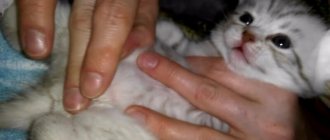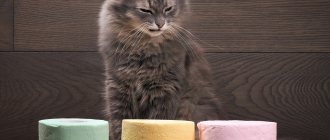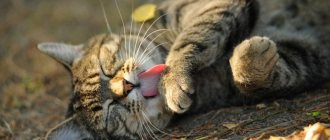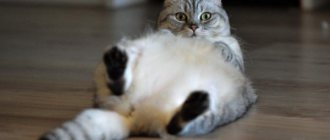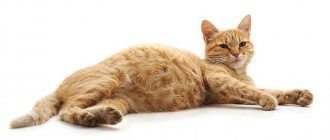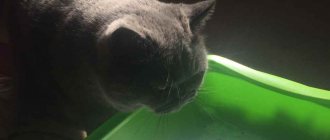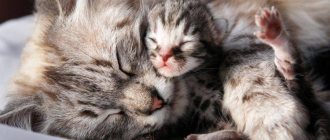How often do kittens go to the toilet? Do the owners think about this and monitor the number of urges? You can consult your veterinarian about this or read this article.
Kittens can pee 5 to 10 times a day depending on their age. The older the animal gets, the less often it goes to the toilet. If the number of visits to the tray is reduced to 4 or less times, this is a reason to consult a doctor. A kitten whose urine contains blood and mucus requires qualified help.
General information about the kitten's toilet
How long should a kitten poop? It is important to know the rate of bowel movements in order to protect your furry baby from health problems.
One month old kittens can poop on their own 3-6 times a day. When changing place of residence, the pet may not poop for about 5 days. After an adaptation period, the stool usually returns to normal, otherwise it is worth taking action.
You can give your pet a light massage of the abdomen and groin area
For your information! The toilet of a newborn kitten is under the complete control of the mother cat. The first three weeks after birth, the cat licks the baby. At the same time, not only body hygiene is observed, but also stimulation of blood circulation and the functioning of the digestive organs.
While licking, the cat uses its rough tongue to massage the belly and groin area. Thus, the sphincter of the anus and the urinary canal are irritated and relaxed, resulting in urination and defecation. The cat licks all the discharge, so the owners cannot detect traces of the kittens’ bowel movements for the first time after their birth.
Sometimes inexperienced females do not properly care for their babies. Your kitten may suffer from a bloated belly where feces and gases have accumulated. The owner can come to the aid of the baby. It is enough to take a brush, bandage or a little cotton wool and gently massage the groin area. This will help the kitten go to the toilet and get rid of discomfort.
To improve digestion and remove gases, you should massage your stomach using circular movements.
In what cases should you consult a veterinarian?
Sometimes in kittens the development of bowel and bladder emptying is accompanied by disturbances. Deviations from the norm can be a symptom of serious problems with the internal organs of a small four-legged pet. You can recognize them in time by:
- constant monitoring of the baby’s behavior during defecation and urination;
- assessing the consistency, color and odor of urine and excrement;
- analysis of the frequency of bladder and bowel movements.
If there are alarming signs, you should take your baby to the vet as soon as possible. It may not reveal any abnormalities in the four-legged patient, but it is better to play it safe, since it is difficult for kittens’ fragile bodies to deal with even minor problems. A veterinarian’s consultation is required for your pet in the following cases:
- Abnormal consistency of feces. They should not be too liquid or dry. Loose stools are only allowed in kittens that are fed only breast milk. In older animals, excrement is normally formed and quite dense. They can liquefy if the pet has eaten something wrong, and return to normal the next day. If this does not happen, it is recommended to show the baby to the veterinarian as soon as possible.
- The presence of foreign matter in feces and urine. Blood, mucus, pus in a kitten's excrement and urine can be a sign of serious pathological processes in its body. There should be no partially digested food in the feces and sand in the urine either. Cloudy urine is a bad sign.
- Changing the behavior of a small four-legged pet. Normally, healthy kittens are energetic and cheerful. They happily eat the dishes offered to them, drink water, sleep soundly, and readily take part in outdoor games. If the animal has become lethargic, apathetic, lies most of the time, sleeps poorly, and does not respond to external stimuli, this is a reason to immediately show it to a veterinarian.
- Firm, enlarged tummy. Normally, in kittens it is soft, without signs of excessive accumulation of gases in the intestines. They should not experience discomfort when feeling it.
- Frequent or, on the contrary, rare bowel and bladder emptying. The pet must visit the litter box daily. If he does not do this every day or the frequency of urination and bowel movements deviates significantly from the daily norm, you need to urgently find out the cause of this phenomenon.
- Difficulty in emptying. If a small pet cannot urinate, often comes to the tray, sits down for a long time and meows pitifully, you should immediately show it to the veterinarian.
- Excretion of urine and feces in small portions. The kitten should have complete bowel and bladder emptying.
- Increased body temperature.
- Partial or complete loss of interest in food.
- Attacks of nausea and vomiting.
- Pale gums.
- Hot nose and ears.
- Loss of body weight.
When a kitten appears in their home, the owners need to not only enjoy communication with their new purring friend, but also provide proper care for it.
To do this, you need to understand the animal’s habits, observe its habits, find out information about when kittens begin to eat and go to the toilet on their own.
How often should a kitten poop: normal bowel movements by age
When do kittens start going to the toilet on their own?
How many times a day should a kitten go to the toilet? Normal bowel movements depend on many factors. One of the main ones is age. The gender of the kitten and its health status are also important.
- at the age of 1-21 weeks, the norm of bowel movements is 3-4 times;
- at the age of 3 to 6 months - 2-3 times;
- over the age of 6 months - 1-2 times a day.
Three-week-old kittens should normally be fed their mother's milk with the gradual addition of solid food. Their feces have a thick and mushy consistency without foreign impurities. There should also be no undigested pieces of food in the stool. A deviation from the norm is considered to be too loose or too dry stool.
The older the kitten, the less often he defecates.
Adult kittens up to three months old are transferred to adult food. As a result, the nature of their bowel movements changes. The feces take on clearer shapes and become thicker. The frequency of visiting the tray depends on the nature of the food. When eating plant fiber, bowel movements occur more often, unlike animals, whose food mainly consists of protein.
Important! The feces of a three-month-old kitten should be of medium thickness without foreign impurities. Too frequent bowel movements or loose stools indicate some kind of disorder in the body.
Females and males go to the toilet differently. Cats pee more often. This is due to the physiological characteristics of the urinary tract. In males they are narrower and longer than in females. If your cat's diet is rich in fiber, he may go to the toilet more often.
Prevention
The incidence of urolithiasis in cats is five times higher than in cats. This disease is one of the most frequently diagnosed after helminthic infestations.
Proper metabolism prevents the formation of stones, so a balanced diet is the key to health, especially when it comes to castrated and sterilized cats. These are truisms, but owners, even when buying premium food, do not comply with the feeding standards indicated on each package, so they mix the finished product with natural food.
Lack of water is one of the reasons for the formation of urate stones, and since cats have a poorly developed sense of thirst, there is a good way to teach your pet to drink more. Place several different vessels with water in different places in the house, this invariably arouses interest in the animals and a desire to try.
Protect your cat from hypothermia. Don't let him sit on a freshly washed floor until it's dry, and don't let him sleep on the floor under an open window. And, of course, watch how often the cat pees. This is the most important marker in home diagnostics of a pet’s health condition.
How often should kittens pee?
How long do pregnant cats walk for the first time?
Veterinarians give owners of small kittens a simple rule that helps determine normal urination in their pets. The essence of the rule is that the amount of fluid entering the body must be equal to the fluid excreted in the urine. The baby has a small bladder, so he will go to the toilet in a small way more often than an adult cat.
The rate of urination also depends on the age, gender and health status of the children:
- at the age of 1-21 weeks, a kitten can pee about 3 times a day;
- animals 3-6 months old defecate 6-10 times;
- Pets older than 6 months pee on average up to 5 times.
With the introduction of complementary foods, kittens can be litter trained
When visiting the toilet, the owner must monitor the quality of urine. You need to pay attention to color, transparency, the presence of blood or mucus impurities. It is also worth noting the process of urination. Normally, it should be comfortable and painless for the baby.
Cat quirks
There is no more mysterious and enigmatic pet than a cat. Every cat owner can immediately tell you about a couple of quirks of his mustachioed pet. We have collected the most common cat oddities - and found explanations for them!
Why do cats love to chew and lick inedible objects?
Cats are partial to plastic bags, Christmas tree tinsel, rain, and other similar things. No wonder - objects made from these materials rustle very attractively, shimmer and attract cats in every possible way! How can you not chew such a wonderful thing? But here you need to be careful, and first of all, the owner! If a cat swallows a bag or rain, this is fraught with serious problems with its health, including death. Rain can cause intestinal obstruction or cut through the intestines. Pieces of polyethylene, once in the cat’s body, injure the mucous membrane - saving the animal after such a “lunch” is very difficult
As for the habit of cats to lick plastic and rubber objects, glossy magazines or photographs, there is nothing wrong with this addiction. It’s just that cats’ sense of smell is much more subtle than that of humans; they are attracted to unusual smells.
Why do cats “wrinkle” sheets and blankets?
Cats will not stop “working” with their claws even if the claws are removed - this is an instinct. And instinct tells the animal that to maintain good cat shape, claws need to be used regularly. Therefore, weaning a cat from sharpening its claws is a thankless task. If you value wallpaper and sofa upholstery so much, it’s better to remove the cat’s claws and let him imitate the “dot” to his heart’s content. As for the situation when cats settle down on the bed and begin to “wrinkle” the bedspread, this is normal. These actions are similar to the behavior of kittens suckling their mother cat. Adult cats do this when they experience the highest degree of comfort and satisfaction.
Why do cats sometimes “wash” people?
Cats can lick not only people, but also each other, dogs and other living creatures. But not any, but only the one that he loves very much! With the help of language, cats express their love and affection. So if your pet regularly gives you a “shame” session, do not drive him away from you - let him show his feelings!
Why do cats start running around like crazy after using the toilet?
They feel good - they went to the toilet, emptied their intestines, their soul felt better, their body also became more comfortable - why not be happy? And at the same time show the owner that he is in a great mood and nothing prevents him from starting the games!
Why do cats like to climb somewhere higher or hide in secluded places?
Instincts are again “to blame” for everything - they tell the domestic “predator” that it is more profitable to take a position somewhere higher, from where it is good to control the situation and it is easy to see both the potential victim and the possible danger.
Another instinct does not allow a single cat to pass by an empty shoebox, drawer or half-open closet - the mustachioed one will definitely climb into such a secluded place. Indeed, in nature, any cat predator always has a den where the cat can rest and gain strength. For example, a lynx's den is usually located in trees, while tigers arrange their resting places on the ground, in places hidden from prying eyes. Cats try to do the same thing at home!
Why do cats sleep so much?
Cats typically sleep up to 16 hours a day. Sleep is very important for a cat. If your cat doesn't get enough sleep, she will become irritable and aggressive and may even get sick. But only domestic cats sleep a lot - well-fed and well-groomed ones. A hungry animal that needs to find food for itself does not spend most of the day sleeping.
Why do cats eat house plants?
There are two reasons for this - firstly, perhaps they lack some vitamins and “eat” them out of indoor flowers. Secondly, domestic cats are often simply bored, and plucking plants brings pleasant variety to their, to be honest, not particularly eventful life. There is nothing wrong with this behavior of an animal if you don’t mind the flowers and the plants are not poisonous. Poisonous ones include: nightshade, spurge, ivy, cyclamen, azalea, poinsettia (Christmas star), etc.
Why do cats constantly rub their heads?
So they put their marks on everything that surrounds them. The fact is that cats have special glands on the sides of their heads, on their lips, which they use to mark their territory. They rub against the owner for the same reason - so that competitors know that this person is already “busy”.
Pathological deviations from the norm
The cat often goes to the toilet a little at a time
The animal may experience abnormalities in normal urination. Veterinarians distinguish between safe and pathological cases. Safe ones include:
- stress caused by moving or the appearance of a new pet or stranger in the house;
- acclimatization;
- change of feed;
- procedure of castration, sterilization or other surgical operations.
All these factors are temporary. After an adaptation period, the number of urinations returns to normal.
You should take full responsibility for kittens who have begun to go to the toilet less often for more serious reasons. Such children usually exhibit abnormalities resulting from the development of various pathologies. If the cat cannot pee for more than two days, or the process itself causes her pain, or the amount of urine is very small, then it’s time to seek help.
The main cause may be an inflammatory process in the genitourinary organs. Signs of pathology are:
- plaintive meowing when urinating or inability to go to the toilet;
- presence of traces of blood, sand or mucus in the urine;
- lack of urination;
- scanty discharge;
- lack of appetite, apathy;
- increased body temperature;
- swollen belly;
- dry and hot nose and ears.
Deviations from the norm can be caused by pathologies in the body
If there is difficulty urinating, the kitten may take a characteristic position while in the tray. It is worth remembering that an animal may not go to the toilet if it is dirty or if it does not like the litter in the tray. Pathological deviations from the norm require immediate contact with a veterinarian. If you let the situation take its course, the kitten may die.
Why does a cat meow all the time at certain times of the year?
If their voice is associated with sexual needs, noted after reaching the age of six to nine months, the sounds made at such moments are difficult to confuse with anything. Loud, long-sounding “meows” do not give people who share shelter with the animal and those who are in the neighborhood any peace, regardless of the time of day. Owners who do not feel sorry for their own ears and nerves have the right to tolerate this, but it will be easier to match the pet with a suitable cat or think about castration.
What to do if there are deviations
Violation of the frequency of toilet visits by a small kitten is usually associated with stressful situations. Such factors disappear by themselves when the animal goes through an adaptation period. The situation is more complicated when urination is impaired due to health problems. In this case, the kitten can either walk too often or too rarely.
Frequent urination
If a kitten pees frequently, then most likely he has developed cystitis, a disease of the urinary organs, or urolithiasis. The baby will often run up to the tray, but the volume of urine will be catastrophically small. Sometimes there is blood in the urine.
Frequent urges can be caused by drinking too much in hot weather, as well as diabetes. Urinary incontinence is accompanied by a large amount of fluid released and no bleeding. The same signs are characteristic of marking territory.
Cystitis most often occurs in adult kittens. The reasons may be:
- drafts;
- sand in the kidneys;
- impaired metabolism;
- mineral imbalance;
- sexual infections;
- predominance of dry food, lack of liquid and proteins.
Deviations from the norm should be studied and treated in veterinary clinics
Cats of any age can get urolithiasis. Signs of the disease are:
- unsuccessful visit to the tray;
- a tiny amount of urine;
- presence of blood in the urine;
- vomiting and high fever;
- lethargy and apathy.
There are cat breeds that are genetically predisposed to this disease. Among them are Scottish Fold, Persian and Siamese breeds.
Also, frequent urination can be associated with diabetes, stress or enuresis. In any case, assistance to the pet must be qualified and timely. If there is the slightest sign of a pathological condition, you should immediately contact a veterinarian. He will prescribe a number of diagnostic measures and adequate treatment.
A kitten who pees frequently will undergo the following tests:
- blood biochemistry;
- Analysis of urine;
- X-ray;
- comparison of the amount of urine and drink;
- Ultrasound;
- hormone test;
- determination of acetone levels and acid-base balance.
These types of studies will help to identify the nature of the disease of the genitourinary system, make a diagnosis and decide on treatment.
In addition to adequate therapy, it is important to carry out a number of preventive measures for the full functioning of the genitourinary system. Regular medical examinations, proper diet, physical activity, and the optimal amount of drinking will ensure normal urination and healthy urinary tract of the kitten.
Too infrequent visits to the litter box
Rare urination is just as dangerous to a kitten's health as frequent urination. In such situations, the main cause is pathological processes, both in the genitourinary system and in the body as a whole. Almost 75% of cases of insufficient urine flow or insufficient discharge occur due to cystitis. Lack of proper treatment will invariably lead to a condition such as acute urinary retention.
Having such a diagnosis, a kitten may not walk for more than a day. This is a dangerous phenomenon that often ends in death. The bladder becomes full and bursts. Urine enters the abdominal cavity, which can lead to intoxication of the body and death of the pet.
Kittens need to be fed crushed food.
The pathology most often occurs in male kittens. For females, such a disease is not typical, although it is also sometimes detected. The main cause of the disease is stones that block the urinary tract. Experts identify other factors:
- blockage of the urethra by a blood or mucus clot. Occurs against the background of trauma to the genital organ or an infectious disease, in particular the bladder;
- abnormal kidney function. With renal dysfunction, the kitten’s body can no longer excrete urine even in minimal volumes. The cause may be a malignant tumor or perforation of the kidney;
- spinal injury or infectious disease affecting the spinal cord. The absence of a nervous connection between the genitourinary organs and the spinal cord leads to disruption of their functioning and the cessation of urination of the animal.
Urinary retention of any stage requires urgent treatment. In the clinic, a kitten may be prescribed the following procedures:
- catheterization using a special catheter that is inserted into the urethra. This will help empty your bladder;
- surgical intervention. Prescribed in case of ineffectiveness of repeated catheterization.
To prevent advanced cases of impaired urination, the owner of kittens must take preventive measures daily:
- animals must receive anti-infective vaccinations on a schedule;
- avoid hypothermia;
- provide access to an unlimited amount of fresh and clean water;
- the diet must comply with the kitten’s nutritional rules according to its age;
- an active lifestyle and outdoor games will also be beneficial.
For any pathological conditions or deviations from the norm, it is prohibited to prescribe medications yourself. Kittens must be treated by a veterinarian. He will also tell you how many times a kitten should poop and pee per day. This will keep your little pet healthy and alive.
Diagnostics
An experienced veterinarian can make a preliminary diagnosis simply by examining the pet and talking with the owners. He will definitely ask how often the cat pees. However, in most cases, one or more diagnostic measures are required:
- urinalysis is an important study that allows you to detect changes in the pH and density of urine, sand, salts, protein, glucose;
- biochemical blood test is a highly informative diagnostic method that determines the condition of internal organs and systems;
- Ultrasound of the abdominal organs is now practiced in most veterinary clinics for the timely detection of infectious, inflammatory and tumor diseases.
Based on the diagnostic results, the doctor prescribes treatment. It is necessary to fight for the animal, especially since modern veterinary medicine has all the necessary means for treatment.
Accustoming a kitten to adult food and litter tray
Starting from the 22nd week of a kitten’s life, it can be gradually introduced to complementary foods. To do this, you can use special canned food for kittens. If food is prepared independently, then the baby should be given it chopped. Gradually, the amount of mother's milk in the kitten's diet decreases, and it completely switches to adult food. At this time, his feces change their structure and shape. They become more formed and dense. At the same time, it is advisable to start accustoming your baby to the tray. The toilet should be placed next to the box where he lives and sleeps. The sides of the tray should be low so that the baby can climb into it himself. It is better to choose crumbly filler. This will help the kitten develop a digging reflex and get used to the toilet.
The frequency of replacing the litter in the tray depends on how often the kittens poop and pee.
The ideal option would be to help a mother cat. Kittens willingly follow the example of adults. If a cat goes to the litter box when the baby is present, the kitten will quickly learn to do this on its own. Over time, the tray can be moved to another more suitable location.
Why does a kitten have problems with stool?
Stress has affected bowel function. A kitten may refuse to go to the toilet due to worries about moving to a new home, changing its owner, or being separated from its mother. To help the kitten get comfortable in a new place, you should protect it from noise, sudden movements, and games with children. The kitten itself must begin to play in the new territory, run, and go to the toilet. If the kitten does not defecate within 5 days, you should contact a veterinarian.
Due to poor nutrition, the functioning of the digestive system is disrupted. In a new home, the kitten must adhere to the diet of its old owners for some time, with a gradual addition of new cat food. When choosing ready-made food, you should pay attention to special diets for kittens.
If a kitten does not walk for more than 5 days, even having gotten used to a new place and food, then constipation may be the cause of problems with stool. By feeling your pet's abdomen, you can determine the presence of bloating, which usually accompanies constipation.
A sign of constipation is the painful process of defecation in your pet. Signs of constipation are also: sitting on the tray for a long time, plaintive meowing.
Signs that a kitten wants to go to the toilet
Many owners have kittens growing up without a mother cat. In such cases, training and litter box training are the responsibility of the owner. First of all, a person should know when the kitten wants to go to the toilet. At this moment, the animal gives specific signs. It's important to just keep an eye on it. The baby wants to go to the toilet if:
- scratches on the floor and other objects;
- sniffs everything around, looking for a place to defecate;
- stomps around in one place, meows subtly and sits down;
- With a strong desire to go to the toilet, the kitten's eyes become glassy. The owner should know that the baby urgently needs to be placed in the tray.
Tray training should be leisurely. It is important to change the litter on time, as the kitten may refuse to go to a stale toilet. Do not neglect to pay attention to the feces and urine of the animal, to see if there are any foreign impurities, pus, worms, blood or mucus. Timely identification of the problem and contacting a veterinarian will prevent the occurrence of serious diseases and complications, which in the future can lead to intractable health problems and even the death of a small pet.
Polo Modis
599 ₽ More details
Polo Modis
499 ₽ More details
Modis backpacks
Tummy massage combined with hair and eye care
Orphans can be massaged with a barely damp cloth, and their eyes can be wiped with a damp cotton swab. The kitten itself will begin to wash itself in 20 - 25 days. Our kitten Moor (which we kept for ourselves, and gave the second one away at one and a half months) began to wash itself from the eighth day, and was captured on this day - for history.
The eight-day-old Moor washes his face for the first time.
In the first 2-3 days, the umbilical cord falls off, so during the first days the belly must be wiped especially carefully. The procedure should be done after each kitten wakes up, causing them to want to defecate.
By 4 weeks, kittens can control their urges to go to the toilet, so litter box training can begin at this age.
When we went to live in the country, we took the tray with us. Once the kittens have woken up, been carried to the litter box and had their tummies and perineal area massaged, and they know that they need to go to the toilet after sleep, the pleasant feeling of relief in the bladder and bowels is automatically remembered and associated with the litter box.
In this way, we practically “led” the kittens to the toilet by the hand, so by the age of one and a half months, Moor began to go to the toilet on his own one day. I watched him for a couple of days, no mistakes happened. Of course, then there were a couple of mistakes, but I washed everything with soap, put the lid on with a few drops of vinegar, and Mavrik forgot that place.
